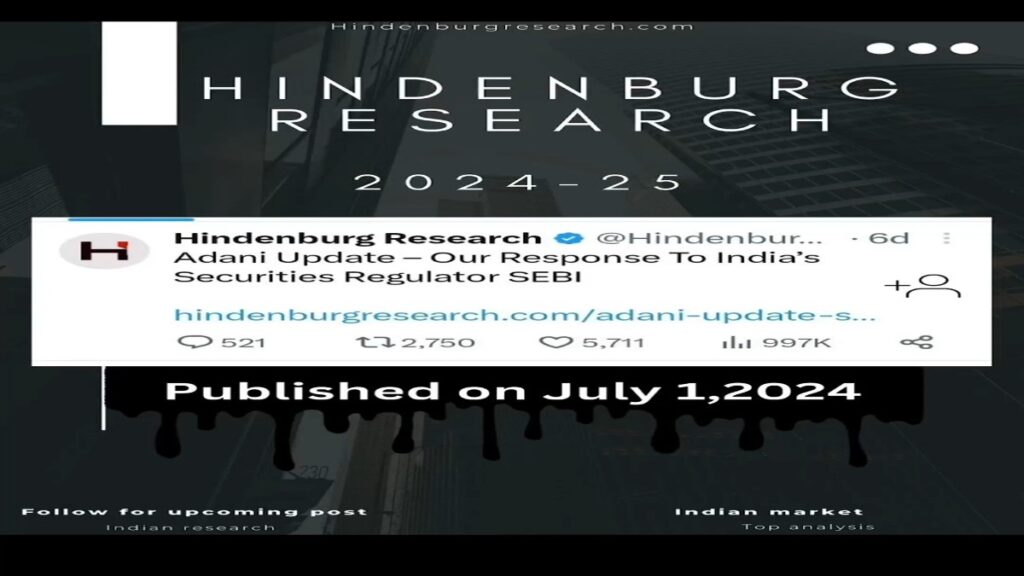Hindenburg
Hindenburg Research, a U.S.-based investment research firm known for its impactful revelations, has once again stirred the waters with its latest cryptic message: “Something big soon India.” This announcement has ignited widespread speculation about which Indian corporate giant might be under scrutiny next.
Hindenburg’s track record of uncovering corporate frauds has made its warnings highly anticipated, especially after its explosive report on the Adani Group in 2023. In this article, we will delve into Hindenburg Research’s recent warning, its historical impact on various companies, and the broader implications of its activities.
Hindenburg Research: A Background
Founded in 2017 by Nathan Anderson, Hindenburg Research specializes in forensic financial research, focusing on exposing corporate fraud, accounting irregularities, and other unethical practices. Named after the infamous Hindenburg disaster of 1937, the firm draws a parallel between catastrophic corporate frauds and the airship’s tragic demise, suggesting that both are preventable with the right oversight.
Hindenburg’s approach involves meticulous analysis, often scouring through public records, internal documents, and interviews with former employees. The firm then releases detailed reports that can cause significant market reactions, particularly when it takes a short position on the targeted company’s stock, profiting from a subsequent drop in share prices.
Historical Impact: Hindenburg’s Past Disclosures
- Adani Group (2023): Perhaps the most notorious of Hindenburg’s reports was the one targeting the Adani Group, an Indian conglomerate led by billionaire Gautam Adani. Released in January 2023, just before Adani Enterprises’ planned share sale, the report accused the group of “the largest con in corporate history,” alleging stock manipulation and accounting fraud. The report led to a massive sell-off, wiping out billions in market value and causing a global uproar. Although Adani has since recovered, the saga underscored Hindenburg’s ability to shake even the most powerful entities.
- Nikola Corporation (2020): Another significant target was Nikola Corporation, an electric truck manufacturer. Hindenburg’s 2020 report accused Nikola of making false claims about its technology, including faking a video of its truck in motion. The report led to a dramatic fall in Nikola’s stock price and the eventual resignation of its founder, Trevor Milton, who now faces fraud charges.
- Clover Health (2021): Hindenburg’s 2021 report on Clover Health, a Medicare Advantage insurer, accused the company of failing to disclose a Department of Justice investigation. The report resulted in a sharp decline in Clover Health’s stock price and raised questions about its business practices.
The Indian Corporate Landscape: A New Target?
The recent announcement by Hindenburg that “something big” is coming soon in India has sent shockwaves through the Indian corporate world. Given the firm’s history, many are speculating about which company could be in the crosshairs. The mere hint of an impending report has the potential to destabilize markets, as investors brace for possible revelations.
The Indian market is no stranger to corporate scandals, and Hindenburg’s involvement adds a layer of global scrutiny. The Adani saga showed how vulnerable even the most powerful entities can be when faced with allegations of impropriety. The anticipation surrounding Hindenburg’s next move highlights the firm’s influence and the anxiety it can generate in financial markets.
Regulatory and Political Reactions
Hindenburg’s activities have not gone unnoticed by regulators and political entities. In India, the Securities and Exchange Board of India (SEBI) has been closely monitoring the aftermath of the Adani report. Hindenburg’s methods, particularly its practice of taking short positions, have been scrutinized, leading to accusations of market manipulation. However, the firm has defended its actions, framing them as a necessary check against corporate malfeasance.
The political implications of Hindenburg’s reports are also significant. In the Adani case, the opposition in India seized upon the report to question the government’s close ties to big business. This created a narrative that linked corporate accountability with broader questions about governance and economic policy.

The Ethical Debate: Short Selling and Corporate Accountability
Hindenburg’s model of short selling—where it profits from a decline in stock prices—raises ethical questions. Critics argue that short sellers like Hindenburg have a vested interest in driving down share prices, which can lead to market instability. However, proponents argue that short sellers play a crucial role in uncovering fraud and protecting investors from overvalued stocks.
The debate over the ethics of short selling often centers on the balance between profit motives and the public good. While Hindenburg’s revelations have undoubtedly exposed wrongdoing, they also create volatility in financial markets, impacting not just the targeted companies but also broader economic stability.
Conclusion
Hindenburg Research’s cryptic warning about something “big” coming soon in India has put the nation’s corporate world on high alert. Given the firm’s history of impactful disclosures, the anticipation is palpable, with significant implications for both the targeted entity and the broader market.
As we await further developments, it is clear that Hindenburg’s role as a financial watchdog, albeit a controversial one, will continue to shape corporate governance and investor behavior. Whether viewed as a necessary check on corporate power or as a destabilizing force in the market, Hindenburg Research remains a key player in the global financial landscape.
This unfolding story will likely add another chapter to Hindenburg’s legacy—one that could have far-reaching consequences for India’s corporate sector and its relationship with global financial markets. As the world watches, the question remains: Who will be Hindenburg’s next target, and what impact will it have on the future of Indian business?

















This was an excellent read. Very thorough and well-researched.
Such a well-structured and engaging article. Thank you!